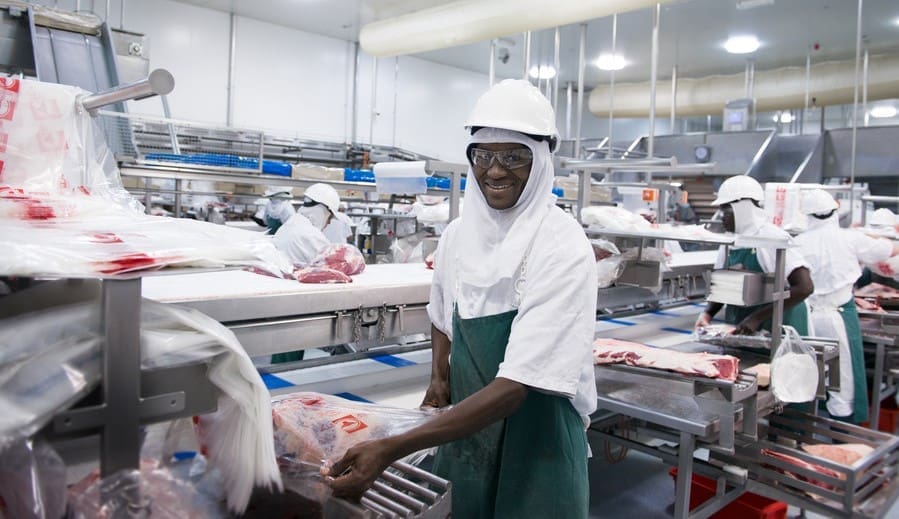Latest listings on Jobs Central recruitment page:
- Chief Executive Officer, Cotton Grower Services-via Rimfire
- ALPA Chief Executive Officer & Company Secretary
- Business & Systems Analyst (12 month contract) – MLA
- MSA Senior Business Development Officer – MLA
- Station Manager, Innamincka – Hancock Agriculture
- Permanent Full Time Farming Position – Burenda Angus
- Farm Hand / Machinery Operator – Stanbroke
- Branch Manager, Rural Services – via LUCASgroup
- Territory Sales Manager, Animal Nutrition-via Rimfire
- Value-Add Supervisor – Northern Coop Meat Co (NCMC)
Click here to access these and other exciting meat and livestock supply chain jobs currently listed on Jobs Central.

MORE than 900,000 immigrants on permanent and temporary visas enter Australia each year. Most live and work in Australian capital cities; immigrants are more urbanised than the average Australian today.
However in the last decade or so, new visa pathways have opened up to attract new immigrant workers and their families to the Australian bush. Increased chances of selection attracts permanent skilled immigrants to accept employment in regional and rural towns.
At the same time, increasing numbers of temporary migrants on working holiday, student and skilled 457 visas are attracted to the bush. A new program for Pacific Seasonal Workers has also been introduced. Immigrant workers add substantially to productivity in the Agricultural industry, a new report reveals.
Growth and benefits For policy-makers, the attraction of getting migrants to rural areas is that it helps reduce labour shortages – particularly during seasonal harvesting peaks – and counteracts the trend of population movement away from the bush to the metropolis. Immigrants, including refugees, play a critical role in the Australian agricultural industry. Some of these immigrants become entrepreneurs, opening up a business. Skilled immigrants in the agricultural sector were also much more likely to have set up their own business (15pc) than those in other industries (9.6pc). When set against the Australian average rate of entrepreneurship (those in the workforce who are self-employed or employers) of 10pc, this propensity for immigrant entrepreneurship in the Australian agricultural sector is very encouraging, since entrepreneurs drive employment and productivity growth in the industry.
457 visa skilled workers find employers in the bush eager to sponsor their immigration application, particularly in professional and technical occupations. Working holiday makers fill critical jobs during harvesting and picking seasons. Seasonal workers from the Pacific are eager to supplement the income of their families back home via remittances. They also get to learn new skills. Immigrant farmers fill the growing inter-generational gap in farm succession and bring with them new technologies and innovations to Australian farming. Zimbabwean immigrant Nicky Mann and her husband introduced hydroponic rose-growing at their NSW central coast operation. Vietnamese and Chinese market gardeners have introduced many new vegetables to expand Australians’ food horizons. Australia takes in about half of all working holiday makers who enter OECD countries. They can work and travel around Australia from job to job. The carrot is a 12-month extension to their visa if they work more than 88 days in the bush. The agriculture, forestry and fishing industries receive the greatest benefit from this arrangement.
Working holiday markers come from more than 20 countries. The UK, South Korea, Ireland, Germany, Taiwan and France provide the largest numbers. Fieldwork with Korean working holiday makers found the majority arrived with the intention of working in the agricultural industry. Most reported that the best thing about their experience was that they had good relations with the non-Koreans they worked with in Australia, learned new skills, had to opportunity to improve their English, and received good wages. The Pacific seasonal workers program allows workers from East Timor, Nauru, Kiribati, Papua New Guinea, Samoa, Solomon Islands, Tonga, Tuvalu and Vanuatu to work in low-skilled jobs for up to seven months in a 12-month period. Most work in the horticultural industry.
The annual intake has grown from around 400 in 2010-11. It is now an uncapped, demand-driven immigration stream that has expanded to jobs in the broader agriculture industry – including the accommodation sector. Many permanent and temporary immigrants in the bush, particularly those who work in the agricultural industry, report receiving a warm welcome. This undermines existing stereotypes.
Higher level of engagement
Many skilled permanent immigrants report strong local connections through sporting, community, school and religious social activities in their regional, rural and remote towns. Those who work in the agricultural industry report a higher level of social engagement – with the exception of sporting activities – than do other immigrants. However, working holidaymakers had more than three times the rate of finalised Fair Work Ombudsman complaints compared to all other workers in 2013- 14. This suggests a high incidence of exploitative work arrangements. The research also noted numerous examples over time of exploitation of temporary migrants on temporary student, skilled work, working holiday or Pacific Seasonal worker visas. Examples of co-ethnic exploitation are also common. The research does not clarify the extent to which temporary migrants working in agriculture experience exploitation. However, experiences of migrant worker exploitation do jeopardise future migrant flows into agricultural jobs. International migration decisions are often based on the experiences of friends and family around the world. This means that unscrupulous employers can undermine the benefits of migrant employment programs for the majority of Australian employers who provide appropriate pay and work conditions.
* Jock Collins is Professor of Social Economics, UTS Business School, University of Technology Sydney
Originally published on The Conversation
Rural Leaders’ Bootcamp reminder
The Right Mind will hold its final Rural Leaders’ Bootcamp for the year in Brisbane on 3-5 September.
Rural Leader’s Bootcamp is an intense and challenging program, exposing participants to a broad range of excellent tools to assist and nurture their path to leadership.
The four-and-a-half day program is conducted over two meetings, approximately four months apart. The time between meetings is filled with each participant’s chosen workplace project, coaching calls and contact with the program facilitators.
Click here for details.



HAVE YOUR SAY